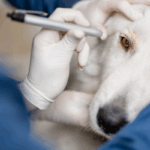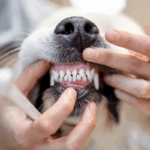You may have noticed that we have been posting a lot lately about the new strains of Calicivirus that are present in Australia.
It is called Rabbit Haemorrhagic Viral Disease – Type 2 (RHDV2), and has been confirmed as being present in Victoria.
Fortunately we have not yet had a confirmed case in Blackburn, or surrounding areas such as Mitcham, Nunawading, Box Hill or Doncaster.
In addition to this new virus, DPI has recently performed a planned release of the Korean strain (RHVD1 – K5) variant of Calicivirus into the wild population.
Here are the facts that we want you, as rabbit owners, to know:
- There are now four types of Calicivirus in Australia that can affect our pet bunnies:
- RHVD1 (the original virus released in 1995)
- RHVD1A (not currently present in Victoria)
- RHVD1 – K5 variant (released into the wild population in March 2016)
- RHVD2
- There is one Calicivirus vaccine available in Australia called Cylap RCD. This is what vets currently use to vaccinate your pet rabbits annually. Like all vaccines we do not have complete immunity or protection, however there is evidence the Cylap RCD vaccine provides some immunity against the RHDV1 and K5 variant. There is growing evidence to suggest the vaccine offers partial protection against RHVD2, however these studies are currently unpublished. It is currently not known how long the immunity against RHVD2 lasts, but the recommendation is to vaccinate adult rabbits 6 monthly (read further for information on younger rabbits).
- Unvaccinated rabbits exposed to RHVD1 can often show no clinical symptoms of being unwell, and are usually found after they have unexpectedly died. The RHVD2 can act in a similar way, but it can also act slower with your rabbits presenting as unwell, quiet, and showing signs of gut stasis (not eating or defecating).
- There is no blood test available to confirm diagnosis of Calicivirus, the only way to obtain a definitive diagnosis is through an autopsy performed by your vet.
The current recommendation for vaccination protocol (by the Australian Veterinary Association, DPI and vets) is as follows:
- Young rabbits: vaccinate from 4 weeks of age, and repeat at 8 weeks and 12 weeks
- Adult rabbits: vaccinate every 6 months
- Unvaccinated or overdue adults: vaccinate twice, one month apart, then vaccinate every 6 months
How to minimize risks to your rabbits:
- Vaccinate every 6 months
- Keep your rabbits indoor where possible especially at dawn and dusk
- Screen outdoor cages with mosquito netting
- Keep new rabbits separate from your current rabbits for at least one week to monitor for clinical symptoms before introducing
- Don’t clip grass from your backyard or public places to feed your rabbit
- Take unwell rabbits to your local vet as soon as they are showing signs of being unwell
- Remember that Calicivirus can be transmitted by insects (fleas, mosquitoes etc., urine, faeces, saliva, bedding, feeding bowls, people, and living animals.
For further information you can visit the AVA website www.ava.com.au/rabbit-calicivirus or call us on 9878 3033.





